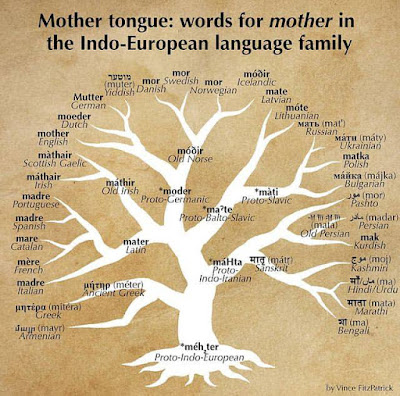The Figure of Holda, Through the Ages
One of the most frequent associations with winter in heathenry is the Wild Hunt. But who is the leader of the Wild Hunt? Could it be Odin, or perhaps a more female host? You may have heard the names Perchta, Hulle, Holda, Berchta, and many other variations. Sometimes she is even called “Frau Gode,” suggesting she is Odin’s wife. Many scholars argue she is an all-mother goddess from the Proto-Indo Europeans.
Holda comes from the Proto-Germanic "hulþaz" meaning "favourable, gracious, or loyal." And if we look at the Grimm’s Fairy Tale “Mother Holle” we see that she rewards those who are humble and loyal, and punishes those who act contrary to these ideals. It seems in particular that she dislikes greedy or lazy people.
Mother Holle is associated with snow. When her quilt is shaken, it snows in the world. And some say Holda is associated with the first snowfall in particular.
But is she a goddess or some sort of spirit who rewards hard work? Holda is associated with spinning, and in particular with enforcing the spinning taboo during Yule. In this way, it seems perhaps she could actually be an aspect of Frigg, and thus Frau Gode. However, spinning is common in the Lore, and associated with women’s work. It is also associated with magic. So perhaps this connection is not enough to link her to Frigg.
Whether she was originally an aspect of Frigg, or not, she was likely a goddess. The idea that she was some sort of spirit seems to come later, after the christianization of her image. Indeed, we can see the signs of her attempted erasure in that she falls out of favour as leader of the Wild Hunt, to make room for the male Odin as he gains the status of All Father, or supreme god of the Nordic peoples, a move towards converting them to monotheism.
In addition, the images of Berchta/Perchta (who are now associated with the Christmas season) take on the form of terrifying witch as an attempt to demonize her. Now, this isn't to say the Holda cannot be terrifying, but that isn't her primary face. You are going to experience her based on how she perceives you. If you possess the qualities she prizes then you will find that she is kind to you, but otherwise you will pay the price. If anything this leads credence to her being a goddess, as her power is evident.
Frau Gode became associated with appearing on Christmas Eve with a broken carriage, seeking the aid of those out late at night, and rewarding them if they were to help her. She would sense if someone was greedy though, and punish them for that. In this story at least we can see some of the original beliefs about her nature coming through.
Often though, the form of Holda has become thinner, less powerful, or even just a fun story for children. The most clear example of this is a figure you might not have guessed, Mother Goose. (Yes, as in Mother Goose’s fairy tales.) There is a possibility that Mother Goose is in fact, Holda, but how did this transformation come to be? Holda was associated with geese. Later, Berchta is described often as having “Goose Feet.” As time went on she slipped further from her original form, into the endearing grandmotherly figure of Mother Goose.
A more modern interpretation is Elsa in Frozen, her image taken from “The Snow-Queen” by Hans Christian Andersen. If you read the fairy tale you can catch glimpses of the figure who inspired it. The ungrateful boy, Kay, is punished for his actions by having his heart turn to ice, while his sister, Gerda, who embodies loyalty and grace, is able to save him with her love.
Skipping back to Holda’s image as leader of the Wild Hunt, Holda's wrath can also be seen as a continued metaphor of her association with winter. The winter is capable of being both harsh and peaceful. Both faces present themselves. In the past, the winter season could be very deadly, and associating it with death, the dead, and the Wild Hunt would be easy to imagine. Even today, if you find yourself in a lonely, windy, wintry place after dark it is not difficult to envision the Wild Hunt all around you. It is easy to feel unease at your own mortality, and be very aware that there are forces much bigger and stronger out there to be reckoned with.
So who is the leader of the Wild Hunt? Holda seems like a likely bet. I don't personally take any issue with also associating Odin with this role. In the modern context you could associate one, or the other, or both simultaneously. As to what was historical, I believe that Holda came first, but beliefs shift over time and vary from region to region. Whether the christians wrote Odin into that role, or whether the shift occurred gradually as the cult of Odin grew stronger, we may never know. The important part is to figure out what makes most sense to us in our own modern practice.
Further Reading:
"Holda" by Diana L. Paxson
"Holda: Between Folklore and Linguistics" by Thomas Leek
"Mother Holle" Grimm's Fairy Tales
Norse Goddess Magic by Alice Karlsdóttir
“The Snow-Queen” by Hans Christian Andersen
Our Troth: Volume 1 - History and Lore
"The Winter Goddess: Percht, Holda, and Related Figures" by Lotte Motz
“Women Leaders of the Wild Hunt” https://steelthistles.blogspot.com/2019/10/women-leaders-of-wild-hunt.html
Image Source:
“The Snow Queen” by Debra McFarlane



